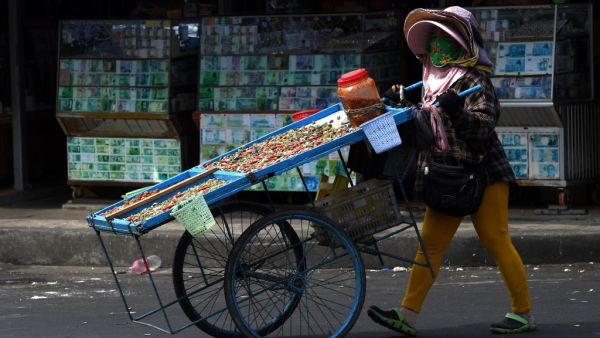Cambodia has confirmed its first death since the pandemic began more than a year ago as it battles a new local outbreak that has infected hundreds of people.
The 50-year-old man was confirmed infected last month while working as a driver for a Chinese company in coastal Sihanoukville and died at the Khmer-Soviet friendship hospital Thursday morning, the Health Ministry said in a statement.
Cambodia has confirmed only 1,163 cases of infection with the coronavirus since the pandemic began, but it is battling a new local outbreak that has infected several hundred people.
Num pais onde o virus, não entrou na politica, e não substituiu o nome de outras doenças, hoje teve o Primeiro óbito por COVID-19 https://t.co/FYCIC1oLzJ
— ELISAEL ALVES ???? (@NillMaster) March 11, 2021
Iran receives 150,000 doses of India's Covid jab
Iran has received a shipment of 150,000 doses of an Indian vaccine, Covaxin, local media reported, as the Islamic republic combats the Middle East's deadliest outbreak of the illness.
"The coronavirus vaccine shipment from India arrived at (Tehran's) Imam Khomeini airport containing 150,000 doses," deputy customs chief Mehrdad Jamal Arvanaghi told ISNA news agency.
Iran, which is in its second month of a vaccination campaign, is to receive another 375,000 doses from India next week, the health ministry's public relations head Kianoush Jahanpour announced on Twitter.
EU regulator meets to evaluate J&J's one-shot vaccine
The European Medicines Agency has been meeting to discuss whether Johnson & Johnson’s one-dose coronavirus vaccine should be authorised, a move that would give the European Union a fourth licensed vaccine to try to curb the pandemic amid a stalled inoculation drive.
The Amsterdam-based EU regulator is scheduled to convene its expert committee in the morning to assess the J&J vaccine data. A decision on whether the agency recommends that the shot be licensed across the 27-nation bloc could come in the afternoon.
The EMA has already approved vaccines made by Pfizer-BioNTech, Moderna and AstraZeneca.
Poland reports over 21,000 cases
Poland has reported 21,045 daily cases, health ministry data showed, the highest tally since November as the country faces a surge in infections driven by a highly contagious variant of the virus first identified in Britain.
In total, the country has reported 1,849,424 cases of the coronavirus and 46,373 deaths.
Denmark halts use of AstraZeneca vaccine
Danish health authorities have said they were temporarily suspending the use of AstraZeneca's vaccine after some patients developed blood clots since receiving the jab.
The move comes "following reports of serious cases of blood clots among people vaccinated with AstraZeneca's Covid-19 vaccine," the Danish Health Authority said in a statement.
But it cautiously added that "it has not been determined, at the time being, that there is a link between the vaccine and the blood clots."
China will continue to work with WHO to seek virus origins
Chinese Premier Li Keqiang has said the country would continue to work with the World Health Organization (WHO) in trying to find the origins of the virus, in response to a question on US criticism that it was not transparent in sharing data on early cases with a WHO investigation earlier this year.
Li, speaking on Thursday at a media briefing at the end of China's annual session of parliament, said China had "acted in a fact-based manner and with an open, transparent and cooperative approach."
Russia reports over 9,000 new cases
Russia has reported 9,270 new cases, including 1,281 in Moscow, taking its total case tally to 4,360,823 since the pandemic began.
The government task force also said that 459 people had died in the last 24 hours, pushing its death toll to 90,734.
Hungary reports record 8,312 infections
Hungary has reported a record 8,312 new infections in a worsening third wave of the pandemic, with tighter lockdown measures and a vaccination campaign not yet sufficient to reverse a dismal trend.
Hungary imposed tough new lockdown measures on Monday to curb a rise in infections and has accelerated its vaccination campaign using Chinese Sinopharm's vaccine as well as Russia's Sputnik V.
Germany's confirmed cases rise by 14,356
The number of confirmed cases in Germany has increased by 14,356 to 2,532,947 data from the Robert Koch Institute (RKI) for infectious diseases showed.
The reported death toll rose by 321 to 72,810, the tally showed.
Exodus looms as thousands of nurses die since WHO declared coronavirus a pandemic
At least 3,000 nurses have died from Covid-19, the global nurses' federation has said as it warned of a looming exodus of health workers traumatised by the pandemic.
The World Health Organisation first described the virus as a pandemic on March 11, 2020.
Now, the International Council of Nurses (ICN) said burn-out and stress had led millions of nurses to consider quitting the profession.
And once the pandemic is over, a dwindling number of experienced nurses could be left to handle the giant backlog of regular hospital care that had been postponed due to the crisis, the ICN warned.
The known death toll of nurses killed by the disease — compiled from just 60 countries — is likely to be a gross underestimate of the full total, the federation said.
READ MORE: 2020 rewind – Timeline of Covid-19 pandemic
Australia unveils $928M package for tourism industry
The Australian government has unveiled a $928 million tourism support package, aimed at boosting local travel while international routes remain closed because of the coronavirus pandemic.
The basket of airline ticket subsidies for travellers, cheap loans to small tour companies and financial aid for the country's two largest airlines is designed to keep the critical sector ticking over until foreign tourists return.
"This package will take more tourists to our hotels and cafes, taking tours and exploring our backyard," Morrison told reporters in Sydney.
"That means more jobs and investment for the tourism and aviation sectors as Australia heads towards winning our fight against Covid-19 and the restrictions that have hurt so many businesses."
China reports 11 new cases vs 5 day earlier
China has reported 11 new cases on the mainland on March 10, up from five cases a day earlier, the country's national health authority said.
All of the new cases were imported infections originating from overseas, the National Health Commission said in a statement. The number of new asymptomatic cases, which China does not classify as confirmed cases, fell to 10 from 16 cases a day earlier.
The total number of confirmed cases in mainland China now stands at 90,018, while the death toll remained unchanged at 4,636.
S. Korea extends use of AstraZeneca vaccine to people over 65
South Korea will extend vaccination for people aged 65 years and older with AstraZeneca's coronavirus vaccine to ramp up its immunisation drive, Prime Minister Chung Sye-kyun has told a government meeting.
The country has been rolling out the vaccine since the last week of February, beginning with the elderly and health workers, but had excluded more than 370,000 over-65s in nursing homes citing a lack of clinical trial data on the age group.
Real-world data from Britain has now shown AstraZeneca and Pfizer and BioNTech's vaccines are both more than 80 percent effective in preventing hospitalisations in over-80s after one shot.
#COVID19 in Asia (June 25):
— COVID19 in Asia-Pacific (@SEACoronavirus) June 25, 2020
- Beijing outbreak seems to be slowing down
- Japan announces 55 new cases, highest jump since early May
- Australia records its first virus death in a month
- 2000 high schools in Malaysia reopened
- Cambodia begins cash stimulus program for the poor
Vir, GSK plan to seek emergency use nod for antibody therapy
Vir Biotechnology and Britain's GSK have said they planned to seek emergency use authorisation (EUA) for their experimental antibody therapy after interim data from a study showed 85 percent reduction in hospitalisation and deaths among patients.
An independent panel recommended stopping further enrolment for the late-stage trial due to evidence of "profound efficacy" of the therapy, Vir and GSK said in a joint statement.
Antibody treatments are designed to decrease the severity among patients diagnosed with the infection.
Additionally, the companies said a new laboratory study showed the therapy, VIR-7831, was equally effective against the UK, South African and Brazilian variants of the coronavirus.
Vir and GSK announced a partnership last year to research treatments.
New antibody treatment reduces risk of hospitalisation
A combination of two monoclonal antibody drugs, bamlanivimab and etesevimab, from US drugmaker Eli Lilly and Co, reduced the risk of hospitalisation and death by 87% in a study of 769 non-hospitalised infected patients with risk factors for developing severe illness.
The results come from a Phase 3 clinical trial of people aged 12 and over with mild-to-moderate symptoms, who were considered high-risk because of their age or underlying conditions.
Among them, 511 received the combination treatment, which is authorized for emergency use in the US, and 258 received a placebo.
There were four hospitalisations and no deaths in the treatment group, while four people died in the placebo group and 11 were hospitalised.
This represented a statistically significant risk reduction of 87 percent.
Brazil registers new daily record for virus deaths
Brazil has registered a new record for daily virus deaths, with 2,286 people dead from the virus in the last 24 hours, according to the Health Ministry.
The country recorded 79,876 new cases, with more than11.2 million total cases of the virus since the pandemic began, according to the official Health Ministry tally.
Mexico's death toll closes in on 200,000
Mexico's Health Ministry reported 6,674 new confirmed cases of in the country and 699 additional fatalities, bringing the total tally of infections to 2,144,558 and 192,488 deaths.
Health officials have said the actual number of infected people and deaths in Mexico is likely significantly higher than the official count because of a lack of wide-scale testing.
Higher pollen levels linked to increased virus rates
Higher pollen concentrations in the air have coincided with increases in infection rates, a large study shows, suggesting a possible link.
Using data from 130 sites in 31 countries, researchers found that airborne pollen levels, sometimes in combination with humidity and temperature, accounted for up to 44% of the variability of infection rates during the spring of 2020.
The effect was not connected with pollen allergies, the researchers said.
In a report by the Proceedings of the National Academy of Sciences of the USA, they explained that in everyone, exposure to pollen reduces the ability of the respiratory tract lining to defend itself against viruses by diminishing the release of the antiviral protein interferon.
The study also reports that under similar pollen concentrations, infection rates were halved when lockdown measures were in place, because the lockdowns limited exposure to both the virus and the pollen that diminishes the immune response.
New lockdown measures for Malta
The Maltese government ordered non-essential shops and schools to close amid a surge in cases on the Mediterranean island.
Prime Minister Robert Abela imposed the measures after Malta saw a daily record of 510 new cases in the country of 500,000 people.
As well as schools and shops, he suspended all organised sport and closed theatres, museums, gyms and religious activities.
Gatherings of more than four people are prohibited.
Other restrictions introduced over recent weeks, including the closure of all bars and restaurants and the mandatory wearing of masks in public areas, remain in place.
Health Minister Chris Fearne said Malta was far ahead of other EU countries in its vaccination campaign against the virus, having given 18% of the population at least one jab.
Herd immunity is expected to be achieved by mid-summer, he said.
This article has been adapted from its original source.








